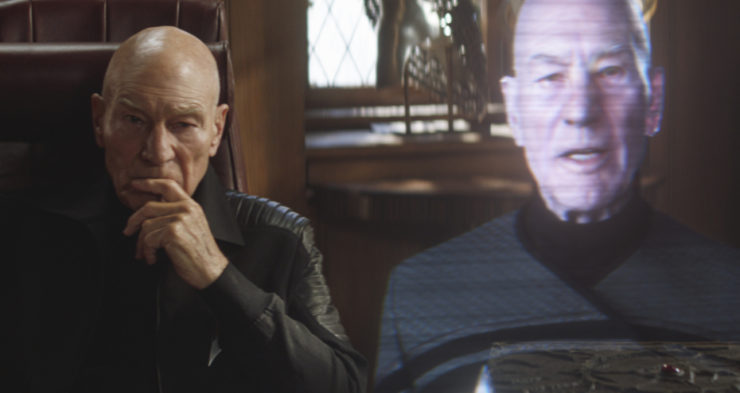After show-running the first season of Star Trek: Picard, Michael Chabon buggered off to work on the TV version of his Pulitzer Prize-winning novel The Amazing Adventures of Kavalier and Klay rather than continue to run the day-to-day of Picard (though he still gets an executive producer credit, which comes with a nice paycheck; nice work if you can get it).
He was replaced by Terry Matalas. While he’s probably best known as the co-creator and co-show-runner of the TV version of 12 Monkeys, it’s worth noting that he got his start as a production assistant on Voyager and Enterprise. And the first thing Matalas did was trash most of what Chabon did, and put his stamp on it (bringing back 1990s Trek characters and doing time travel)…
Where the mission statement of the first season of Picard was to finally move the story of Trek forward past Nemesis (which had been the farthest forward any Trek screen production had as its “present day” up until January of 2020), the second season of Picard was entirely about looking either backwards or sideways.
Buy the Book
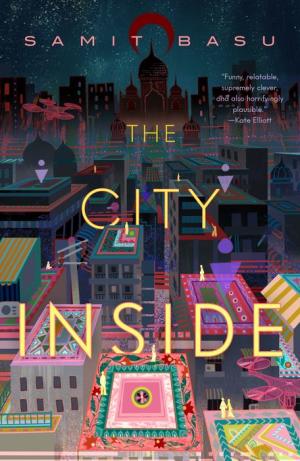

The City Inside
Let’s start with how the series opened, because one of the biggest problems with this season is that each of the first three episodes made a promise for what the show was about, but only the third one was a promise that was kept.
The season began with all the characters in different places, not necessarily for good character reasons, but because the plot needed them to be there. It reminds me of Ghostbusters II when they made Dana Barrett an art restorer and Louis Tully a lawyer, even though they were a musician and an accountant in the previous movie, not because it made sense for their characters, but because the plot wouldn’t work if they were in their other jobs.
The cast comes together at that old Trek standby, a spatial anomaly, which is transmitting a message for Picard. The Stargazer, under the command of Rios—whose rejoining Starfleet is one of those Ghostbusters II bits—is examining it, and Picard is sent to answer the call. There’s a fleet brought along also, including the Excelsior on which Musiker is serving and where Elnor is doing a field rotation as a Starfleet cadet—his going to the Academy being another Ghostbusters II moment.
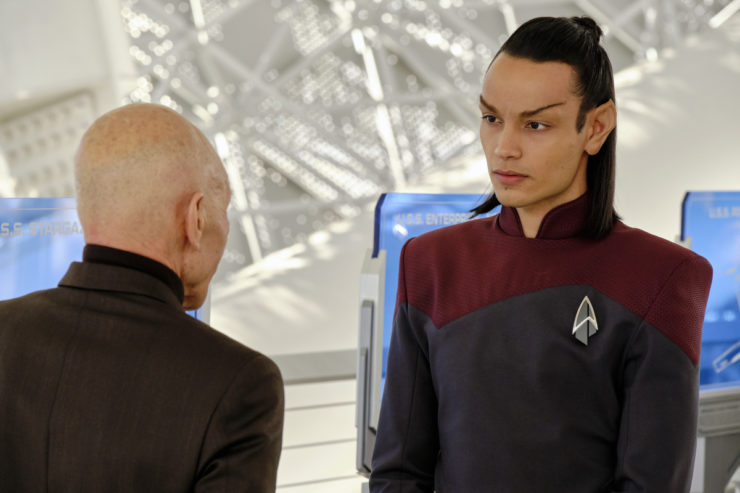
This is the second time a Secret Hideout show has promised a nifty show premise in its season premiere episode and then given us something completely different that makes you long for the first thing. Discovery did it with “The Vulcan Hello”/”Battle at the Binary Stars” (I’m still annoyed that we didn’t get the series with Captain Georgiou on the U.S.S. Shenzhou with First Officer Burnham and Second Officer Saru), and Picard‘s sophomore season did likewise. Everything we saw in “The Star Gazer” would’ve made a great season of television, from Picard as Academy commandant (a job he turned down way back in TNG’s “Coming of Age,” remember, but he was younger then…) to Rios as captain of the Stargazer to Seven now using La Sirena for the Fenris Rangers to Soji doing a goodwill tour of the Federation now that the synth ban’s been removed. (Elnor as a cadet not so much, but still, that at least would’ve shown us more of the Trek universe at the turn of the twenty-fifth century.)
Instead, we bring the band back together at this anomaly, when a new masked Borg Queen shows up and starts to assimilate the fleet. Picard activates the auto-destruct, everything blows up—
—and then Picard finds himself in an alternate timeline where Earth is run by fascists and at war with most of the Alpha Quadrant. He’s been brought there by Q because he has to do penance. For reasons the scripts never bother to explain, Q has also brought the people in the opening credits of Star Trek: Picard to this alternate timeline. Well, except for Soji, but Isa Briones will have more to do soon.
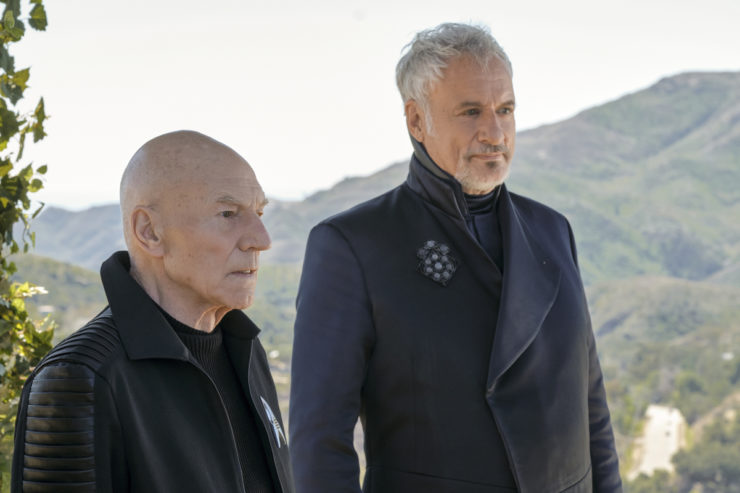
Here’s where it starts to become obvious that characters are being used, not because their presence makes sense for the plot, but because they were already under contract to be in this season. After mostly wasting Elnor in the inaugural season, the hope that he would be better developed in season two was dashed by Elnor being killed in the third episode, showing up as hallucinations and flashbacks and as a hologram before being restored in the final episode.
Let me be blunt: Elnor serves absolutely no purpose in this season. He’s there because Even Evagora had a contract and they had to shove him in a requisite number of episodes to justify his salary. This isn’t based on any inside information, mind you—I have none on the subject—but it’s supposition based on the facts in evidence, which is that you could remove Elnor from the season and nothing of consequence changes.
Not that anyone else’s presence in the alternate timeline makes sense, either. Why would Q specifically bring these people? The only ones Picard has a significant personal connection to are Musiker and Elnor, so bringing them makes sense, but even then, Q is an omnipotent entity who apparently hasn’t interacted with Picard since TNG’s “All Good Things…” Why would Q bring a freighter captain Picard hired once, an ex-Borg he barely knows, and a cyberneticist sent to infiltrate his personal mission whom he also barely knows (oh, and who’s also a murderer)?
Anyhow, the hope that we might get a “Mirror, Mirror“-style look at an alternate timeline where our heroes are bastards are also dashed, because the gang pulls a trick pioneered on the original series’ “Tomorrow is Yesterday” and also used in “Assignment: Earth” and The Voyage Home: slingshotting around the sun to travel through time.
And then the remainder of the season until the back end of the finale all take place in 2024 Los Angeles.
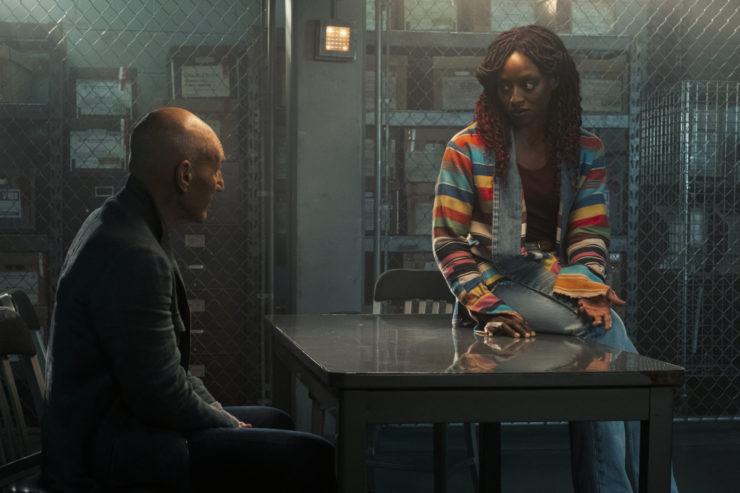
The use of actors who were already under contract is one of many ways in which Matalas, et al seem to be focused more on keeping the show under budget than telling the story they want to tell. Most of the sets are either ones that were already created for season one (the Château Picard mansion, La Sirena) or in contemporary L.A. where the show films and don’t require much alteration to work, since it’s only two years in the future. And roughly three-quarters of the season takes place in the same setting as the filming location, leaving only the first two episodes and the very end of the last one to take place in the future.
Isa Briones’ contract also has to be fulfilled, ditto Brent Spiner’s, so we get more Soong family insanity! Spiner plays his fourth member of the Soong family (having played Noonien, Data’s creator, in TNG’s “Brothers,” “Birthright I,” and “Inheritance,” Noonien’s son Altan in Picard’s “Et in Arcadia Ego” two-parter, and their ancestor Arik in Enterprise’s “Borderland,” “Cold Station 12,” and “The Augments”), the twenty-first-century geneticist Adam, while Briones is his genetically engineered daughter Kore.
The actual alleged point of this season is to get Picard to face a childhood trauma that he has repressed up until now: his mother was mentally ill and committed suicide, and it was Picard’s own fault, in a sense, as he let her out of the room she’d been locked in so she could go to the solarium and hang herself.
I get what Matalas and Sir Patrick Stewart were trying to do here: Stewart himself is a survivor of abuse by his father, but he also came to learn later in life that his father, who fought in World War II, suffered from PTSD (it was called “shell shock” back then, not that anyone did anything about it). And so Picard’s arc here deals with an abusive parent, and also a parent with a mental illness—but they’re separated, as it’s the mother who has the mental illness, and dealing with her (and the aftermath of her suicide) is why the father was so abusive.
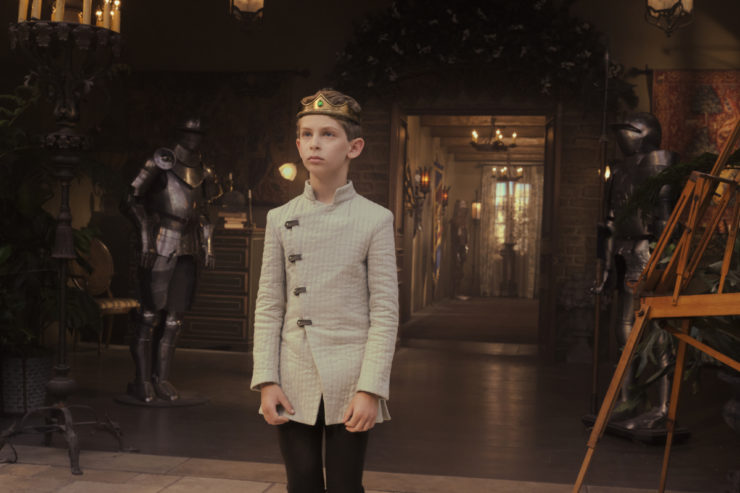
Unfortunately, while the notion has its heart in the right place, none of it really works. For starters, we have no idea what Yvette Picard’s mental illness is exactly. And while it’s true that the Picard family was established as being Luddites who eschew modern technology and conveniences in TNG’s “Family” (a legacy Picard rejected when he went off to Starfleet Academy), we’re still talking about a future in which mental illness is very rare (viz., the original series’ “Dagger of the Mind” and “Whom Gods Destroy,” which take place many decades prior to Picard’s childhood). More to the point, locking someone mentally ill in a bedroom is behavior that would be prosecuted as abuse now, much less three hundred years from now. The whole thing feels like a nineteenth-century treatise on how hysterical women were dealt with: lock them away for their own good, lest they hang themselves. It’s a story out of 1810 or 1910, not 2310, or even 2022.
And if Q pulled Picard from the explosion to the alternate timeline to do personal penance, why did he complain when Picard went into the past? Why was Q trying to affect Renee Picard’s going on the Europa mission? Oh yeah, Picard has an ancestor who went on the Europa mission, which is the turning point of history; if the mission fails, Earth becomes fascist, if it succeeds, we get the Federation.
The time-travel and history-changing makes no sense, even by Trek’s pliable standards of time travel. The gang came back in time from the Confederation timeline, which is why Seven doesn’t have her implants (no doubt another budget-saving move), but somehow it’s part of the mainline timeline, as their actions restore everything to the way Guinan remembers it, including meeting Picard in her bar in the twenty-first century. But it was a different time track where Guinan never met Picard in the nineteenth century, and—ugh!
Oh, and the time travel did have an opportunity to do some social commentary, on the appalling treatment of people with darker skin that has been a rising issue in this country ever since the 2016 presidential election, with the crackdowns on immigration by people from Mexico and the Middle East. (And yes, it’s that targeted. I live in an area filled with Irish immigrants of varying levels of legality, and they don’t get raided by ICE for some inexplicable reason, cough cough.) But the social commentary is brought up in a couple of episodes, and serves as a subplot for Rios, but it doesn’t actually go anywhere, and is forgotten by the season’s midpoint, never again to be mentioned.
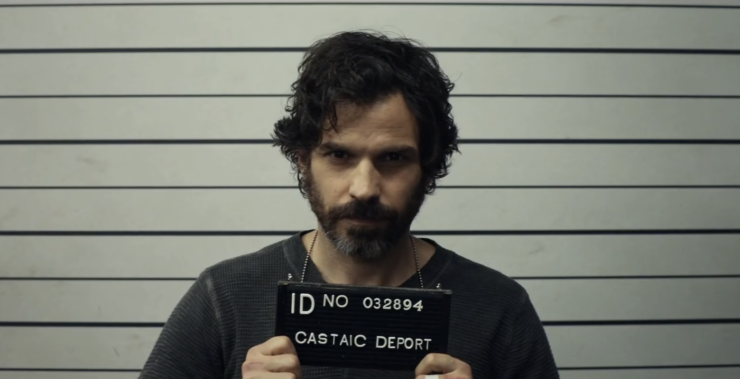
That subplot for Rios mostly seems like an excuse to give Matalas and the gang a reason to get rid of Santiago Cabrera. They’d already effectively written Soji out after the first episode, and Briones’ other role goes off to become a Traveler with Wes Crusher in the finale, and Elnor was marginalized by his temporary death, and Rios in the end decides to stay in the twenty-first century with Dr. Teresa Ramirez and her son. Because it totally makes sense that he’d want to stay in a past which he knows has a nuclear war in its near future. (Okay, maybe that’s why he wants to stay, to help Earth in a tumultuous time, but it isn’t even brought up, he just says he never fit in the future and that’s it.)
We get a few other subplots thrown in for good measure, including Picard and Guinan (the younger version of whom is played by Ito Aghayere, who does an excellent job of channeling Whoopi Goldberg; Goldberg plays the role as an older woman in the first and last episodes) being arrested by an FBI agent named Wells who’s suspicious about alien activity. It’s basically the same role Jay Karnes played in 12 Monkeys, though that was a 1940s-era agent, and it’s not remotely clear why this side plot is even there, as it has nothing to do with anything.
Which puts it in good company with a lot of this season. There’s a lot of gadding about and doing things for the sake of doing things, but very little of it seems to have anything to do with the stated intent of Picard serving penance for torturing himself for his mother’s death, which is mentioned repeatedly throughout the season, but only touched on when the script decides it’s a good time to do so, taking breaks from it for no obvious rhyme or reason.
I’ve been slagging this season a lot, but it has its moments. For starters, we have the Jurati-Borg Queen pairing, which is a fascinating team-up that produces some stuff that is great (Jurati bantering with the Queen in “Watcher“) and some that’s not-so-great (the completely ridiculous Pat Benatar karaoke in “Two of One“). However, the end result is a very Star Trek one: Jurati convinces this version of the Borg Queen—who is the last survivor of the Borg in the Confederation timeline—to try a new way of being Borg. To become a Cooperative rather than a Collective. (This is similar to what the ex-Borg Chakotay met in Voyager’s “Unity” did. For more on the Jurati-Borg Queen pairing, Jaime Babb’s excellent article on the subject here on Tor.com.)
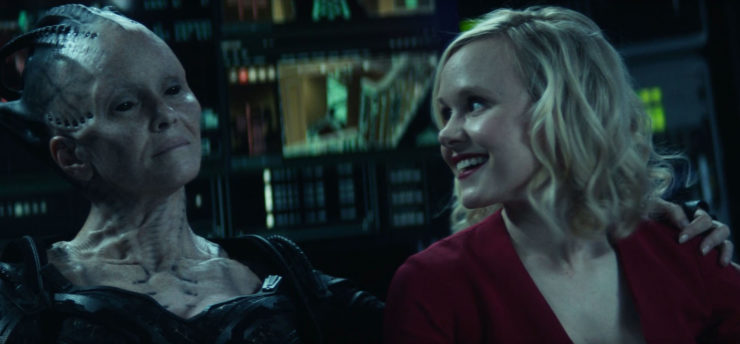
Getting there brings up another aspect of this season that didn’t work, which is the Unconvincing Speech That Somehow Convinces People. It happens three times in this season, and I didn’t buy a single one of them. There’s Picard talking Renee into putting her fears aside and doing the Europa mission in “Two of One.” There’s Picard convincing Agent Wells in “Mercy” to not distrust aliens because the aliens he met as a child weren’t trying to rip his face off, they were Vulcans trying to mind-meld him and erase his memory (how would that make him feel better about aliens??????). And there’s Jurati convincing the Borg Queen to be kinder and gentler in “Hide and Seek.”
In the end, Q reveals that he did all this supposedly as a final gift to Picard before he dies, because “even gods have their favorites.” Except Q didn’t entirely do all of it, and it kind of had to happen because if they hadn’t gone back in time, the Jurati Queen wouldn’t have been the one to show up in the anomaly and my head hurts! Augh!
One of the things I was looking forward to when they announced that John deLancie was coming back as Q is the superlative double act that deLancie and Stewart are when they put Picard and Q together. The best Q stories are the ones that keep those two next to each other as much as possible, and the worst ones are the ones that don’t (which is why Q’s appearances on DS9 and on Voyager did not work).
So it was disappointing to see that deLancie and Stewart are only paired up twice for any significant length: at the top of “Penance” and in the middle of “Farewell.” There were a few bits and bobs elsewhere, but mostly Q was interacting with other people outside of those two scenes, and it was a major letdown, especially since the image Paramount chose to use to sell the season was a lovely shot of Picard and Q side by side.
Based on comments made by Briones, Evagora, and Alison Pill, the three of them won’t be coming back for season three, and it’s already been announced that all the “big seven” stars of TNG will be appearing in Picard’s final season. Which, based on the choices made in season two, is what the new show-runner wanted all along…
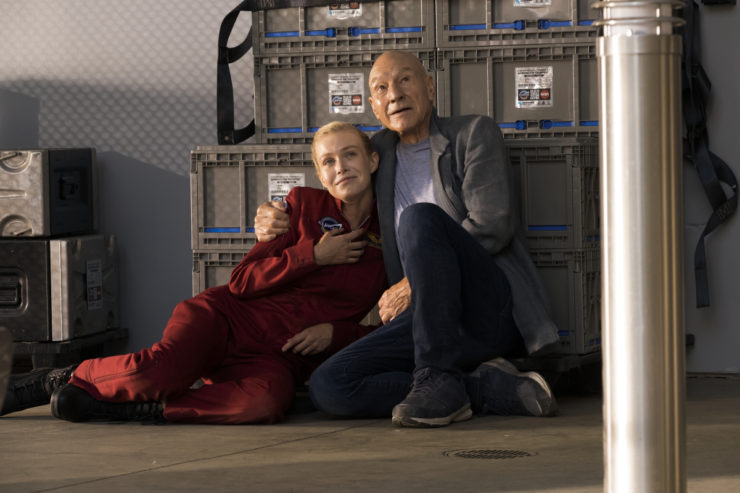
Keith R.A. DeCandido has two anthologies coming out in June: One is Three Time Travelers Walk Into… from Fantastic Books, in which each story has three people from different parts of history interacting (Keith’s “What You Can Become Tomorrow” features author Mary Shelley, baseball player Josh Gibson, and NASA scientist Florence Johnson). The other is Zorro’s Exploits from Bold Venture Press, which features seventeen new stories featuring Zorro, the original caped crusader, as he defends the downtrodden in Alta California in the nineteenth century (Keith’s story is called “A Lovely View”).










